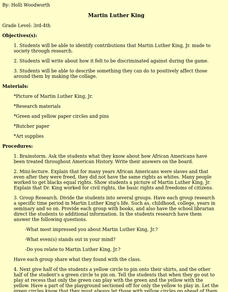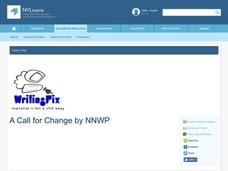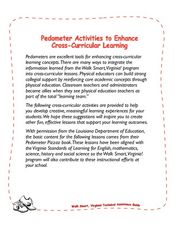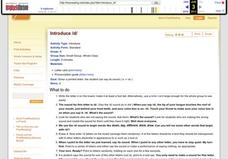Curated OER
Martin Luther King
Identify contributions that Martin Luther King, Jr. made to society through assigning a research project! Third and fourth graders write about how it felt to be discriminated against during the game. They describe something they can do...
Curated OER
Thanksgiving
First graders summarize similarities and differences of life in England and America for the Pilgrims by reading a mini-book. Then, they write a journal entry in first person on what it is like to be a pilgrim in England and in America....
Curated OER
Feelings and Emotions
Students discuss and write about different feelings they or someone else may have. In this feelings lesson plan, students discuss different ways they express their feelings. Then they get a picture with someone who is demonstrating a...
Curated OER
A Call for Change
"Come gather round people, wherever you roam..." Bring the voice of Bob Dylan to your class with this lesson plan, which takes Dylan's song "The Times They Are A-Changing" and analyzes both the message and voice in the lyrics. Your class...
Curated OER
Pedometer Activities to Enhance Cross-curricular Learning
Learners complete different activities involving pedometers such as writing a creative story, calculating step averages, researching pedometers, calculating calories, and much more.
Curated OER
Reintroduce /o/
There are many words that begin with the /o/ sound; scholars study this letter in multiple contexts including intial phoneme examples, pronunciation, and letter recognition. Write the letter on the board to see if learners can identify...
Curated OER
Regarding the Fountain: A KWHL Strategy
A KWHL strategy prepares young readers for the different type of writing found in Kate Klise's story of the Dry Creek Middle School drinking fountain. Step-by-step directions, student and teacher copies of the KWHL template, and...
Safe Drinking Water Foundation
Making a Difference
After learning about the effects of water pollution, your class will discuss ways to make people in their community aware of the importance of water conservation. Then, your young environmentalists will write a letter to the local...
It's About Time
Color Reactions that Involve the Transfer of Electrons
Demonstrate the aging of materials as you assist the class in creating rust. Individuals demonstrate oxidation-reduction reactions that result in the rusting of materials, differentiate between materials that will and will not rust, and...
Chandler Unified School District
Art Masterpiece: Leonardo’s Inventions—Leonardo da Vinci
Leonardo da Vinci is the focus of a hands-on activity that encourages scholars to become inventors. Pupils brainstorm and sketch their idea, compose a detailed depiction using a mirror writing technique, and antique the paper for a...
Curated OER
Fabulous Fairy Tales
Young scholars examine how story telling using literary elements found in fairy tale genre is one way to read and retell, discuss and analyze, as well as write and produce their own fairy tales.
UNICEF
Knowing Your Risk for HIV/AIDS
What are the various ways people can become infected with HIV? Build awareness with your pupils and dispel common myths on the transmission of HIV with this resource, which includes a brainstorming activity, group discussion, and a...
Alabama Learning Exchange
Introduction to Division
Examine how addition, subtraction, multiplication, and division relate to and are separate from each other. As they listen to the book, The Doorbell Rang, they demonstrate the math described in the story by cutting up paper cookies and...
Scholastic
Identifying Types of Irony Using "The Gift of the Magi"
O. Henry's "The Gift of the Magi" is the classic example of irony in literature. Teach young writers about the ways irony can engage their readers with an activity in which they write scripts using dramatic irony, situational irony, and...
Curated OER
What is a Fable?
Learners read a variety of electronic Aesop's fables to define fable and moral, and write and illustrate an original fable. They then publish their fable using PowerPoint.
Curated OER
Acting Like a Third Grader (Part 1)
Third graders, after brainstorming the positive and negative types of behaviors, become aware of the right and wrong way to behave as a third grader. They perform a skit that demonstrates the skills and behaviors used by third grade...
PBS
Frame Yourself: Area and Perimeter
Elementary schoolers are arranged in pairs and view the video Math Works: Measurement: The Difference Between Perimeter and Area. They discuss any prior knowledge they have of the term perimeter and then brainstorm together what the...
Smithsonian Institution
Art to Zoo: Life in the Promised Land: African-American Migrants in Northern Cities, 1916-1940
This is a fantastic resource designed for learners to envision what it was like for the three million African-Americans who migrated to urban industrial centers of the northern United States between 1910 and 1940. After reading a...
Curated OER
Social Class Stereotypes
Encourage your young scholars to think about how and why people and categorized in terms of social class. They decide what "class" they belong to, and then brainstorm about the indicators that society uses to define class and to...
Curated OER
Water Uses and Children's Lives in East Africa
Students explore water usage around the world. In this "water" social studies lesson, students brainstorm ways in which water is used. Students visit the Water in Africa website to view pictures of water usage in Africa. Students...
Curated OER
Acting for the Common Goods
The first of a three-part series on bullying, this plan has class members present skits about bullying, write and sign an anti-bullying pledge, and complete a service project. For the skit, learners use information from previous lessons...
Curated OER
Introduce /m/
Start by drawing a large letter m on the board for scholars to see. Do they know what letter this is? Once you've demonstrated the sound it makes, use these tips to help them make the same sound. There is even an audio pronunciation...
Curated OER
Introduce /f/
Hook your scholars by drawing a large f on the board; do they know what letter this is? Once you've demonstrated the sound it makes, use these tips to help them make the same sound. Although the audio function is neat, it may not be...
Curated OER
Introduce /d/
Give youngsters a better grasp of the letter d by combining letter sounds, pronunciation, recognition, and word examples. Scholars examine the letter shape then listen to you make the /d/ sound and try it on their own. Kids brainstorm...
Other popular searches
- Writing Brainstorming
- Story Writing Brainstorming
- Brainstorming Writing Prompts
- Writing Process Brainstorming

























